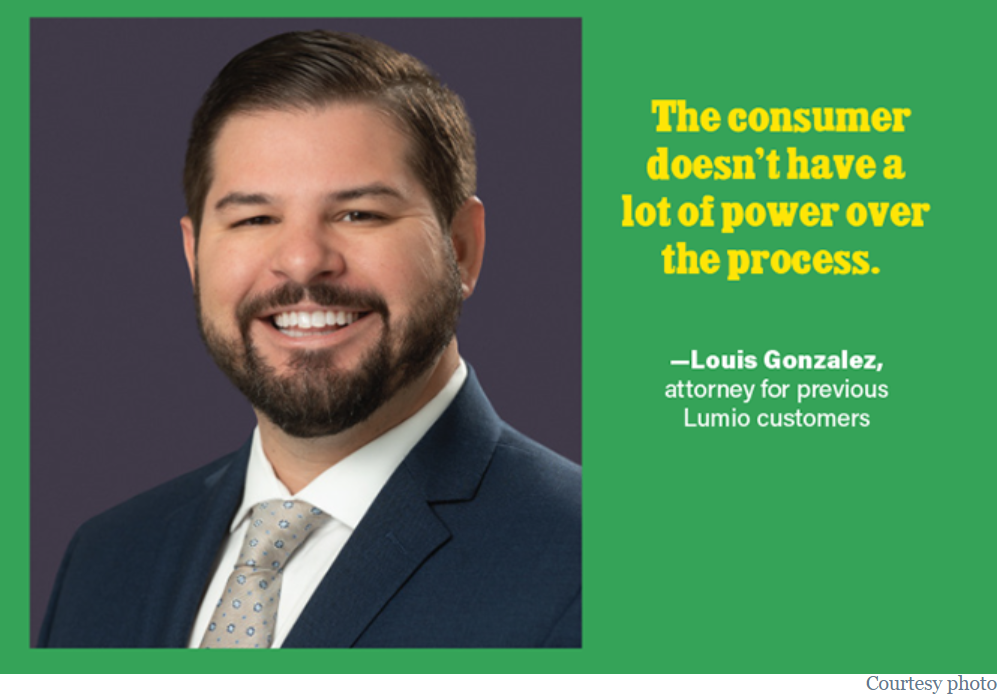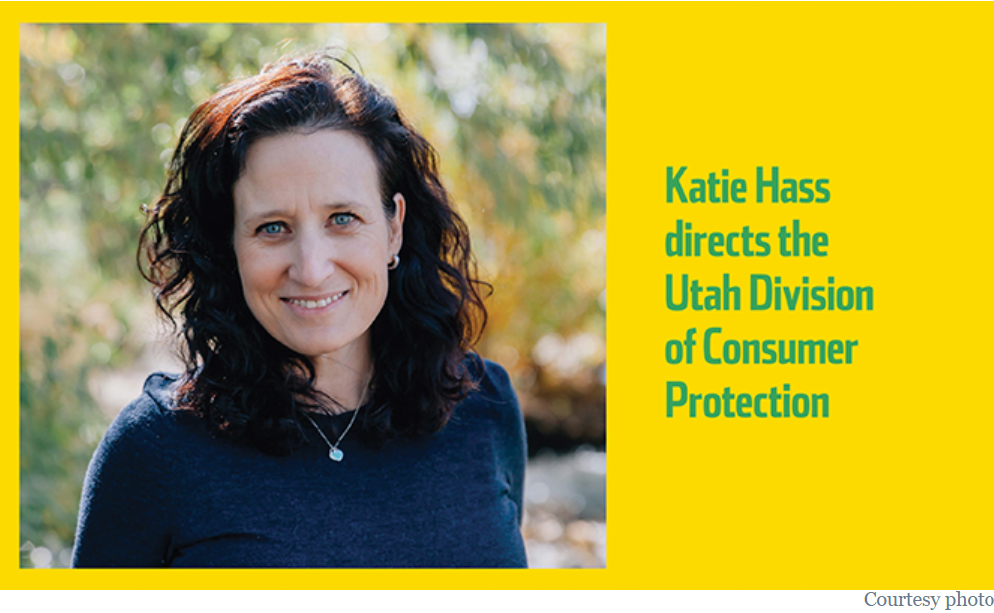
The following story was reported by The Utah Investigative Journalism Project in partnership with Salt Lake City Weekly.
“I guess you could call me a tree hugger,” said Washington state resident Tammy Crough on why she decided to install home solar power in 2023.
“I love trees, the Earth, and I think solar is a good way to capture that energy,” she said. “But I guess you could also call me sort of a prepper.”
While living in a small town “in the sticks,” 60 miles outside of Houston, Crough lived through Hurricane Ike punching her town’s lights out in 2008. She went 18 days without power, during which time she ran her appliances on a generator, took showers by candlelight and played every card and board game imaginable with her kids.
“I’ve always wanted to do right by the environment and do right in a disaster, so I’ve always just wanted solar,” she said.
In June of 2023, Crough was living in Washington state when she signed up for solar through a company called Lumio. The process was going smoothly until Lumio sent an inspector to check out her roof.
“He literally just flew a drone over my house and said, ‘Good to go!'” she said.
But when a separate contractor came to install the panels, they told her that, in fact, she had to have her whole roof replaced.
Crough got the roof replaced, but then could not get Lumio to install her solar panels, or even return her phone calls.
She waited for months before signing with a different company.
That’s when Lumio demanded she pay $2,700 for the inspection. “The only communication I got from them for six months was when I canceled it, and they wanted money that they didn’t deserve,” Crough said.
Kirt Heap was another Washington state customer who experienced the same lack of communication with Lumio—but for him, it was after the company installed his system.
The solar panels were up in the summer, and he was ready to soak up the savings, but Lumio couldn’t coordinate with his local power company to get the panels turned on for roughly five months. All the while he was paying his loan but reaping no benefits.
“There’s a time crunch here in Washington,” Heap said. “There’s only so much of a solar producing season.”
Mychi McDole is a real estate agent in the Central Valley area of California. Living just outside of the picturesque Sequoia National Park, she had plans of turning an addition on her home into an Airbnb rental that used solar power.
But it was almost two years ago that Lumio put the panels up, and since then, McDole said, workers damaged her roof and the panels don’t function as promised. “Not only did they mess up my house, they messed up my income,” she said.
McDole also experienced a case of the disappearing salesman. “Once he got paid, he stopped answering his phone,” she said.
Utah has long held a reputation for exporting legions of door-to-door solicitors across the country, hawking everything from pest control services and home security systems to, more recently, solar panels.
The phenomenon of young, clean-cut members of The Church of Jesus Christ of Latter-day Saints returning home from their proselytizing missions and quickly applying their door-knocking experience to direct sales jobs was even profiled in The New York Times.
Utah’s business culture has been an epicenter for door-to-door sales that in some cases is endorsed by Utah’s government with generous tax breaks.
A consumer advocate, a lawyer suing Lumio in a class-action lawsuit and former customers like McDole were all surprised to learn that Lumio had received a $40 million tax incentive from the Utah Governor’s Office of Economic Opportunity to keep its business headquarters in the state.
McDole has hired a lawyer and is still battling the company over her claim of roof damage and for giving her what she said is false information about tax rebates being able to offset a third of the $40,000 loan she had to take out.
When McDole heard about Lumio’s tax incentive, she was astounded.
“Where’s my fucking tax break?” she asked.
‘Like Uber did for the car ride’
A June 2021 Forbes article heralded the formation of Lumio as an answer to the climate crisis. Noting that Lumio resulted from the merger of five companies—Atlantic Key Energy, DECA, Lift Energy, Our World Energy and Smart Energy Today—the article described a “decentralized service platform” to shake up the solar industry, “like Uber did for the car ride.”
As a result, the company in its first month was named “a Top Five U.S. solar provider with a 12-month run rate of more than $1 billion in gross sales, over 3,500 employees covering 37 states and strategic partnerships rare in a new company.”
By this account, Lumio hit the solar market like a supernova, exploding onto the scene with immediate and spectacular success. But the company was not even a registered business entity in Utah until the fall of 2021.
This registration came shortly after the Governor’s Office of Economic Opportunity (GOEO) board voted in September 2021 to award a $40 million tax incentive to Lumio in exchange for the company pledging to stay in Utah and bring 3,697 new high-paying jobs over the next 20 years.
This cloudy company history goes to the heart of a lawsuit Florida attorney Louis Gonzalez filed against Lumio in October 2023. He says the company is “playing around with the corporate structure to shield themselves from liability.”
The case was filed on behalf of Shoshana Smith, a Lehigh Park, Florida, resident who had received solar panels from Atlantic Key Energy in the fall of 2021 at a cost of $68,912.
Her complaint alleges that the panels did not produce energy for the first nine months, had other breakdowns and that workers damaged her roof installing them. Plaintiffs said the suit was brought because Lumio has refused to take responsibility for the damage.
Gonzalez said his clients experienced high-pressure sales tactics, with finance companies that immediately disburse funds to Lumio as soon as the panels are up, no matter if they work.
“The consumer doesn’t have a lot of power over the process,” Gonzalez said.
The lawsuit is in its early stages, but Gonzalez has a dozen clients and looks to sign up many more. “There are hundreds, if not thousands, of negative reviews we referenced in our class-action complaint,” he said.
Currently, the Better Business Bureau lists Lumio as 3.09 stars out of five, with 673 complaints resolved in the past three years.

While Lumio is a new company, its principal, Greg Butterfield, was previously the CEO of Utah’s Vivint Solar but left that position in May 2016.
During Butterfield’s tenure, however, Vivint Solar emerged as a major focus of a report by the nonprofit advocates at the Campaign for Accountability. They reviewed consumer complaints related to solar panel installation filed with the Federal Trade Commission between 2012 and 2016 and found more than half were about Vivint Solar and one other company.
The report noted Vivint Solar’s history of legal battles. In 2018, the New Mexico attorney general sued the company for allegedly deceiving homeowners into being locked into long and expensive contracts.
The company denied the allegations but paid the state roughly $2 million and agreed to change its marketing practices and provide ethics training to employees. In 2019, the company also reached a settlement with the state of New Jersey over similar allegations.
Campaign for Accountability spokesman Michael Clauw said what’s most troubling is the number of victims who might not be tech savvy enough to research a sales pitch. “A lot of the victims of these deceptive actions are often seniors who might have less technological literacy to go online and Google a company or a sale,” Clauw said.
Jacob Whiton is a research analyst at Good Jobs First, a national organization promoting accountability in publicly funded economic development programs. He says not awarding incentives to companies with bad consumer track records should be a “no brainer”—but it’s not.
“It seems like common sense—right?—that companies which have received regular violations should not be receiving subsidies for private investment,” he said. “And yet, you would be shocked how little we see that reflected in the sort of statutory requirements governing these programs.”
While many states bar companies with legal or regulatory actions against them from receiving state contracts, few prohibit tax incentives for the same reason.
Lumio refused multiple requests for an interview, initially criticizing the Utah Investigative Journalism Projects’ reporter as illegitimate after demanding they provide a formal license or credential, something that does not exist in Utah.
Later, after receiving detailed questions related to the allegations in this report, Lumio attorney Michael Green defended the company in a written statement.
“Lumio is committed to doing the right thing for our customers. We inherited some issues through the acquisition of a regional company with some low-level sales managers whose practices were in direct violation of our established policies and manner of doing business. We have terminated our relationship with the responsible parties and closely monitor this matter to satisfy customer concerns and re-establish goodwill.”
Green continued: “The allegations in pending litigation in no way reflect Lumio’s institutional practices.”
Lumio has denied allegations against it in its lawsuits. Butterfield, who co-founded Lumio, stepped down as CEO at the end of 2023.
Sunshine is the best disinfectant
Transparency is not just a concern for consumers. The activities and performance of Lumio in the state don’t allow for a lot of sunlight.
Under state law, the GOEO closely guards information about company incentives to protect their business interests. Audits and performance compliance reviews of companies are not public. The agency cannot even confirm if an audit or review has happened.
While the GOEO will publicly announce a company’s long-term goal, the company will receive annual tax breaks based on a yearly forecast of jobs created—a forecast that is determined by the company. The company also doesn’t even have to hit that yearly goal, it just has to meet at least 50% of its projection.
The GOEO utilizes multiple state agencies to provide oversight of a company to make sure it earns its tax break, but there isn’t anything in the state contract that would penalize the company or terminate its incentive if the company was found guilty of civil or criminal fraud or cited by a state or federal consumer protection agency. One section of the contract requires the company to comply with the law in Utah and elsewhere, but it defines no penalties for a company that doesn’t.
Asked about the possibility, the GOEO in a statement said: “We would take these very seriously.”
According to the state contract, a tax liability could be imposed against a company if it was shown to have misled the state about job creation or state income tax.
But other possible crimes wouldn’t necessarily affect the deal. GOEO was asked if past legal complaints against Vivint Solar had been weighed by the board in awarding the incentive to Lumio, and the GOEO refused to answer the question.
GOEO was also asked if GOEO board chair Carine Clark had a conflict of interest in approving Lumio’s 2021 incentive. According to the GOEO website, she is currently listed as chief innovation officer for Lumio. In an email, GOEO spokesperson Tony Young clarified that Clark did not work for Lumio when the incentive was awarded in September 2021—she became an executive there in May 2022 but does not hold an ownership interest in the company.
Lumio’s influence in state government is opaque in other ways. Shortly after Lumio was created and won its incentive, the corporate attorney for the company, Nathan Sumbot, formed a company called Oakwood Consulting.
That consulting company made $49,450 in campaign contributions to various lawmakers and Gov. Spencer Cox from 2021 to 2023.
Sumbot previously worked as counsel for former Gov. Gary Herbert, under whom Cox had served as lieutenant governor. In an interview, Sumbot said he knew Cox while he worked for Herbert but that he has not talked to Gov. Cox about Lumio.
The lobbyist for Oakwood—Adam Gardiner, who has long been active in politics and previously worked as state director for Sen. Mitt Romney—said there’s nothing improper about the campaign donations. He noted that Lumio pays him a fee, and he uses part of that to make contributions to elected officials.
“I use some of my business money to make donations to legislators, all of which is disclosed,” he said. While Gardiner said Lumio would not tell him who to donate to, the company knew he was using part of their fee to make campaign donations.
“That’s part of why anyone would hire a lobbyist,” he said. “They know I do all this stuff; that’s why I think I’m hired.”
For Florida attorney Gonzalez, it’s troubling that so many bad actors in the industry take cover in the public’s recognition that solar is key to a healthy future.
“These companies are hiding under this white cape,” Gonzalez said. “[They’re] really flying under the radar because no one is looking at this industry as one that has bad conduct.”

Mea$ure Twice
Katie Hass is the director of the Utah Division of Consumer Protection. She warns that Utahns need to slow down fast-moving sales pitches and do their homework.
“[You] don’t have to make a decision so quickly,” Hass said. “You’re not rude to ask someone to go away from your doorstep.” Here’s some other key tips:
• Get your own loan: Shop around for loans for solar—don’t just go with the company recommended by the salesman. “You should make sure you have control,” Hass said.
• Check with your power company: They can fact-check a salesperson’s claims on energy savings.
• Do your homework: Check different companies, talk to your neighbors and also visit dcp.utah.gov where you can search to see if the state has taken legal action against a company or placed them on a Buyer Beware list.
• File a complaint: If a Utah company ripped you off, but you live out of Utah, you can still file a complaint with the Utah Division of Consumer Protections, and they will investigate the company.
If you enjoyed this article and would like to support more investigative reporting like it, please consider making a tax-deductible donation by visiting utahinvestigative.org/donate.



Leave a Reply